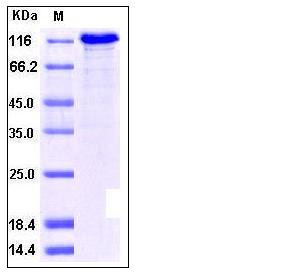Human Tie2 / CD202b Protein (His & Fc Tag)
CD202B,TIE-2,TIE2,VMCM,VMCM1
- 100ug (NPP1697) Please inquiry
| Catalog Number | P10700-H03H |
|---|---|
| Organism Species | Human |
| Host | Human Cells |
| Synonyms | CD202B,TIE-2,TIE2,VMCM,VMCM1 |
| Molecular Weight | The recombinant human Tie2/Fc is a disulfide-linked homodimeric protein. The reduced monomer consists of 970 amino acids and predicts a molecular mass of 108.5 kDa. As a result of glycosylation, the apparent molecular mass of rhTie2/Fc monomer is approximately 125-135 kDa in SDS-PAGE under reducing conditions. |
| predicted N | Ala 23 |
| SDS-PAGE |  |
| Purity | > 90 % as determined by SDS-PAGE |
| Protein Construction | A DNA sequence encoding the extracellular domain (Met 1-Lys 745) of human Tie2 (NP_000450.2) precursor was fused with the C-terminal polyhistidine-tagged Fc region of human IgG1 at the C-terminus. |
| Bio-activity | Measured by its binding ability in a functional ELISA . Immobilized recombinant human Angiopoietin-2 at 10 μg/ml (100 μl/well) can bind Human Tie2 / Fc chimera with a range of 0.2-20 μg/ml. |
| Research Area | Immunology |Inflammation / Inflammatory Mediator |Inflammatory Cytokines & Chemoki and Receptors |Angiopoietins and Angiopoietin-like Protein Families |
| Formulation | Lyophilized from sterile 100mM Glycine, 10mM NaCl, 50mM Tris, pH 7.5 1. Normally 5 % - 8 % trehalose, mannitol and 0.01% Tween80 are added as protectants before lyophilization. Specific concentrations are included in the hardcopy of COA. |
| Background | TEK, or TIE-2, is an endothelial cell-specific receptor tyrosine kinase (RTK) that is known as a functioning molecule of vascular endothelial cells. TEK comprises a subfamily of RTK with TIE, and these two receptors play critical roles in vascular maturation, maintenance of integrity and remodeling. Targeted mutagenesis of both Tek and its agonistic ligand, Angiopoietin-1, result in embryonic lethality, demonstrating that the signal transduction pathways mediated by this receptor are crucial for normal embryonic development. TEK signaling is indispensable for the development of the embryonic vasculature and suggests that TEK signaling may also be required for the development of the tumor vasculature. |
| Reference |
